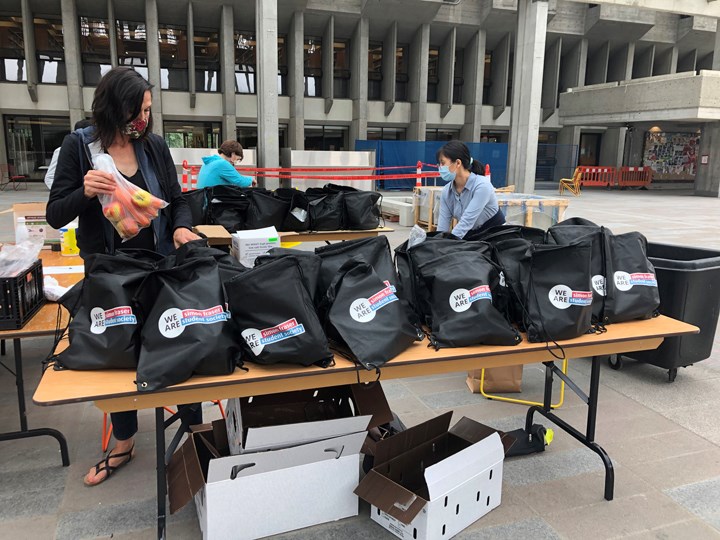COVID-19 has dramatically impacted many aspects of our daily lives. Disparities in our society have become increasingly apparent as more of the population, including students, find themselves suddenly without income and, in some cases, without reliable access to food.
To make matters worse, many ‘secondary food hubs’ – food donation sites operated by non-profit and local organizations – have been forced to close their doors in recent months due to health and financial concerns. That has been a major blow to local community members who have come to rely on these hubs for food and the network of support they provide.
Fortunately, despite some community food hubs shutting down, the Burnaby Neighbourhood House, operating through the United Way Local Love Food Hubs program, has been working with partners to ensure new locations are opening in their place. Among those partners is SFU’s Office of Community Engagement, who recognized early on that students would not be immune to the economic challenges presented by COVID-19.
“The closure of secondary food hubs is a primary source of instability for vulnerable communities in Burnaby,” says Tara Flynn, SFU’s civic and community engagement coordinator.
“There is a deeper relationship formed when people have access to smaller hubs, which in turn leads to a greater capacity for reliably responding to regular and at-risk clients. With fewer hubs, community members both young and old have less access to food and a reliable support system.”
In April, Flynn and her SFU colleagues connected with the Burnaby Neighbourhood House and the Simon Fraser Student Society (SFSS) to plan for a new food hub on SFU’s Burnaby campus.
Those efforts have led to a secondary food hub pilot project, launched last week, that provides students with the opportunity to apply for a weekly collection of perishable and non-perishable food items.
The three-month pilot project has received funding from an SFU Community Engagement Initiative grant – a program available to SFU faculty and staff who are working on a community project that will strengthen relationships and have meaningful impact. According to Flynn, that is exactly what this project is designed to do.
“Having a food hub located on campus allows students to access the food they need without having to travel into Burnaby to use already overburdened community food hubs,” says Flynn. “Despite currently having significantly fewer students living on campus due to COVID-19, we are already seeing many students apply for support through the SFU Food Hub. This really underscores the need that exists on campus but also gives us a sense of just how big of an impact this will have on our students and community.”
Following the three-month pilot, Flynn and the Office of Community Engagement hope to transition the secondary food hub over to the SFSS, which will continue to fund and operate the program moving forward.
The long-term goal, says Flynn, is to build on this project to create a hub that offers additional support and services to students. “This is really only the beginning and I can’t wait to see how this hub will grow and adapt within the SFU community in the years ahead.”
More information about the SFU Food Hub program and the Community Engagement Initiative, including a complete list of all 2020 grant recipients, is available on the Office of Community Engagement website.



